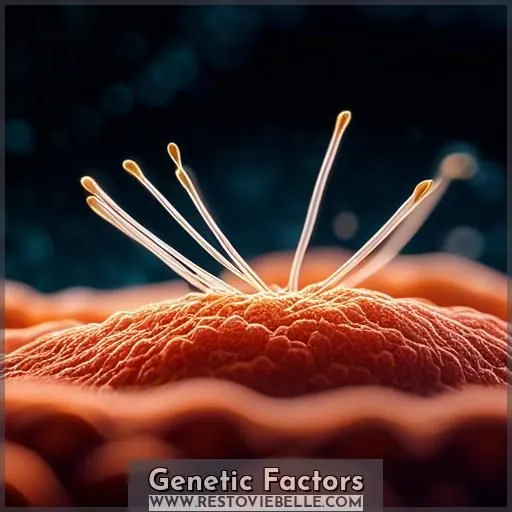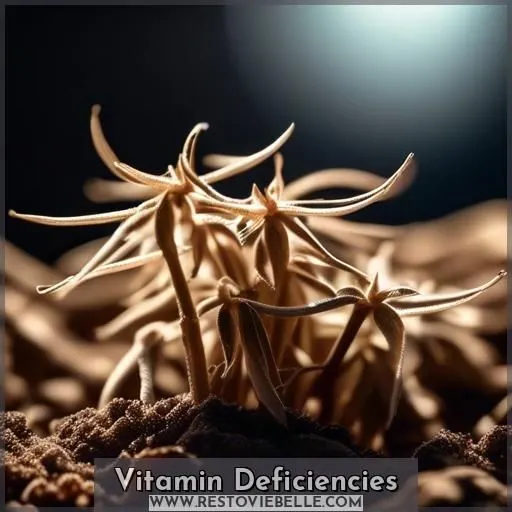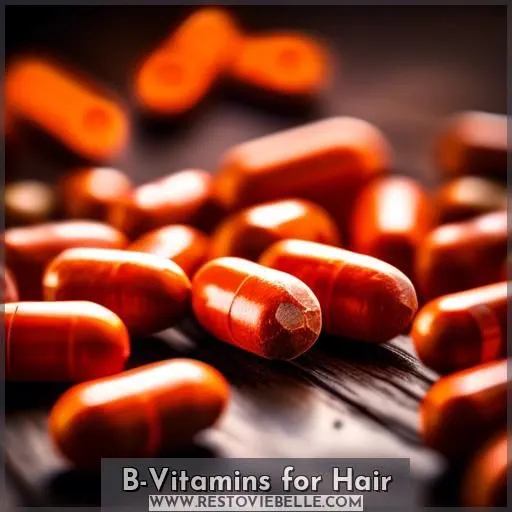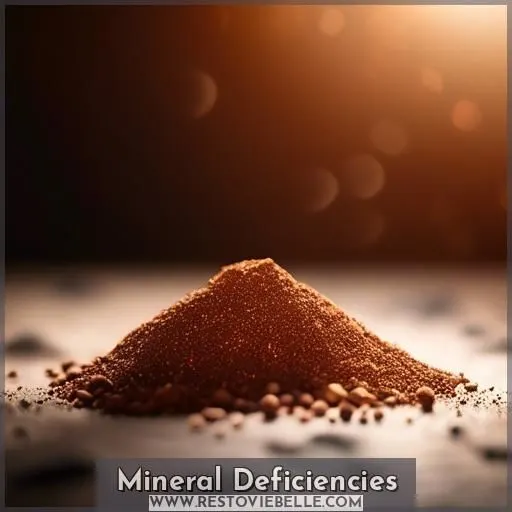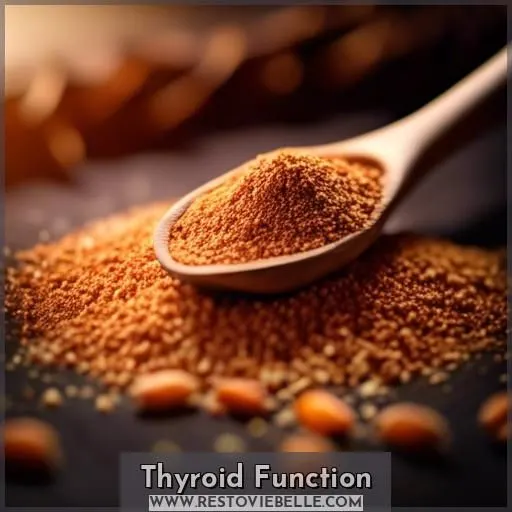This site is supported by our readers. We may earn a commission, at no cost to you, if you purchase through links.

You seek ashwagandha’s ancient wisdom to combat premature graying?
This rejuvenating Ayurvedic root calms the mind, managing stress that robs melanin’s vibrancy.
Its antioxidant prowess protects pigment-producing melanocytes from oxidative harm.
Ashwagandha nurtures melanin synthesis, allowing your locks to retain their youthful radiance.
Embrace nature’s gift and discover the secrets to luscious tresses brimming with vitality.
Eager to unveil ashwagandha’s full potential? Then let this be your first step on a transformative journey.
Table Of Contents
Key Takeaways
- Ashwagandha can help combat premature graying by managing stress, which robs melanin’s vibrancy, and protecting pigment-producing melanocytes from oxidative harm.
- Ashwagandha’s antioxidant properties help protect melanin from oxidative stress, which can lead to premature graying. By enhancing melanin production, ashwagandha ensures that your locks maintain their youthful vitality, repelling the silver strands effortlessly.
- Ashwagandha has been found to play a vital role in the production of melanin, the pigment responsible for hair color. It does this by protecting melanin from oxidative stress, supporting melanin production, and stimulating the production of melanin.
- Incorporating ashwagandha into your routine, along with other natural remedies like B-vitamins and Ayurvedic herbs, can provide a comprehensive approach to maintaining healthy, colorful hair.
Genetic Factors
While genetics play a significant role in the graying of hair, ashwagandha’s potent antioxidant properties help combat oxidative stress, a key contributor to premature graying. By managing stress and promoting melanin production, this ancient herb can reveal your hair’s youthful radiance, even in the face of genetic predispositions.
Ashwagandhas Antioxidant Properties
Delve into the time-honored knowledge of Ashwagandha, a nutritional powerhouse that serves as a valiant protector for your scalp. This exceptional herb not only combats hair loss; it’s replete with antioxidants that target the underlying cause of gray hair – premature greying. By enhancing melanin production, Ashwagandha guarantees that your locks maintain their youthful vitality, repelling the silver strands effortlessly.
Ashwagandhas Role in Stress Management
Ashwagandha, a potent adaptogen, can help manage stress, which is a common cause of hair greying. By reducing cortisol levels, ashwagandha strengthens hair follicles, making them less susceptible to the effects of stress-related inflammation. Incorporating ashwagandha into your routine, along with other Ayurvedic herbs like Amla, can help alleviate stress and promote healthier hair.
Ashwagandhas Effect on Melanin Production
Ashwagandha, an ancient herb, has been found to play a vital role in the production of melanin, the pigment responsible for hair color. Here’s how:
- Antioxidant Properties: Ashwagandha’s antioxidant properties help protect melanin from oxidative stress, which can lead to premature graying.
- Stress Management: By reducing stress, ashwagandha indirectly supports melanin production, as stress can negatively impact the enzymes responsible for melanin synthesis.
- Melanin Production: Ashwagandha has been shown to stimulate the production of melanin, helping to maintain hair color and prevent premature graying.
- Hair Color: By supporting melanin production, ashwagandha helps to maintain the natural color of your hair, keeping it looking youthful and vibrant.
- Holistic Approach: Incorporating ashwagandha into your routine, along with other natural remedies like B-vitamins and Ayurvedic herbs, can provide a comprehensive approach to maintaining healthy, colorful hair.
Obesity
Obesity and premature graying are linked.
Excess body weight potentially impacts the health of hair follicles and melanocytes, the pigment-producing cells in the skin.
Dietary changes and lifestyle modifications can help manage obesity, which in turn may slow down the graying process.
Incorporating foods rich in vitamins B12, E, C, biotin, iron, zinc, and copper can support melanin production and reduce the risk of premature graying.
Additionally, regular exercise and maintaining a healthy weight can contribute to overall hair health.
Smoking
Smoking is a habit that can have a profound impact on your hair health. It’s not just about the nicotine and tar in cigarettes, but also the toxins and chemicals they contain. These substances can lead to premature graying, hair loss, and even damage the appearance of your hair. Here are four ways smoking can affect your hair:
- Reduced melanin production: Smoking can disrupt the production of melanin, the pigment that gives hair its color. This can lead to premature graying, as the hair follicles stop producing adequate melanin, causing the hair to turn grey.
- Inflammation: Smoking triggers the release of pro-inflammatory cytokines, which can damage tissues throughout the body, including hair follicles.
- Hormonal imbalance: Smoking interferes with hormone levels, including estradiol and aromatase. This can diminish estrogen levels, affecting hair growth and texture.
- Collagen degradation: Collagen, essential for healthy hair and skin growth, is degraded by smoking. Collagen deficiency impacts hair volume, shine, and resistance to premature greying.
To combat these effects, consider incorporating ashwagandha into your routine. Ashwagandha is an adaptogen that can help manage stress, reduce inflammation, and support hormonal balance. It has been shown to strengthen hair, delay grey hair, and even reduce hair fall. You can use it in various forms, such as a hair mask, scalp fortifying mask, or hair rinse.
Stress
Stress is a common trigger for gray hair, and it’s not just about the emotional turmoil. Stress hormones, such as cortisol, can cause inflammation and damage the hair follicles, leading to premature graying. Chronic stress can also impact the production of melanin, the pigment responsible for hair color, causing hair to lose its natural color.
To combat stress-induced graying, consider incorporating stress-reducing practices into your daily routine. Ashwagandha, an adaptogenic herb, has been shown to reduce stress levels and cortisol production. It works by modulating the hypothalamic-pituitary-adrenal (HPA) axis, which is responsible for the stress response.
In addition to ashwagandha, hibiscus flower is another natural remedy that can help reduce stress. Hibiscus contains compounds that can lower cortisol levels, promoting relaxation and stress relief.
If you’re experiencing chronic stress, it’s crucial to address the underlying causes. This may involve seeking professional help, such as therapy or counseling, to develop coping strategies and improve overall well-being.
Vitamin Deficiencies
The realm of hair is an intriguing one, replete with mysteries and natural remedies to preserve the youthful and radiant appearance of our tresses. One such secret resides in the unassuming ashwagandha, a plant-based panacea that has been employed for eons in Ayurvedic healing. However, prior to delving into the merits of ashwagandha for gray hair, let’s first examine the role of vitamin inadequacies in the graying process.
Vitamin deficiencies can play a pivotal role in the premature graying of hair. For example, a copper deficiency can precipitate hair loss and premature graying due to its involvement in melanin synthesis. Similarly, iron deficiency can also contribute to premature hair graying. Zinc deficiency may also be a factor, as it can impair the absorption of copper, which is essential for melanin production.
To combat these deficiencies, you can include certain foods in your diet. Catalase-rich foods, such as onions, garlic, almonds, beef liver, and leeks, can aid in boosting your copper levels. Additionally, curry leaves and black sesame seeds are known to be copper-rich and can be utilized in hair masks to promote hair well-being.
Incorporating these natural remedies into your daily routine, coupled with a balanced diet, can help address vitamin deficiencies and potentially decelerate the graying process. However, remember, every individual’s body is unique, and it’s always prudent to consult with a healthcare professional before making any substantial modifications to your diet or supplement regimen.
B-Vitamins for Hair
B-vitamins are a group of essential nutrients that play a key role in maintaining healthy hair. These water-soluble vitamins are involved in various bodily functions, including cell growth, energy production, and the production of red blood cells, which are essential for delivering oxygen and nutrients to your hair follicles. Let’s explore the specific B-vitamins that can benefit your hair:
- Biotin (B7): Often referred to as the hair growth vitamin, biotin supports amino acid metabolism, which is crucial for hair growth. A deficiency in biotin can lead to severe hair loss and weakening of hair.
- Folic Acid (B9): Folic acid is primarily responsible for healthy cell growth, including those found in your skin tissues and hair follicles. It helps generate new cells, which is essential for maintaining the health and growth of your hair.
- Vitamin B12: This vitamin is involved in the production of red blood cells, which transport oxygen around the body. A deficiency in B12 can have significant effects on the production of new, healthy cells, particularly when it pertains to supporting healthy hair growth.
- Vitamin B2 (Riboflavin): Riboflavin plays a dynamic part in maintaining the vitality of your locks by assisting in the conversion of nutrients from food into energy. This ensures that your hair follicles receive the nourishment they need to thrive.
- Vitamin B3 (Niacin): While not directly recognized for supporting hair growth, niacin aids in cleansing blood and pushing blood through your body. This allows your scalp to feed off the nutrient value and oxygen it promotes.
To guarantee you’re getting the right amount of B-vitamins for hair growth, consider incorporating a well-balanced diet rich in whole foods, such as beans, broccoli, citrus fruits, green leafy vegetables, meat, nuts, poultry, wheat germ, and fortified cereals, white rice, and breads. If you’re deficient in vitamin B-9, you may need supplementation. Additionally, biotin can be supplemented through a daily intake of supplements and a diet rich in protein sources.
Stress Management
After delving into the realm of B-vitamins and their crucial function in preserving your hair’s vibrant hues, let’s venture further into the domain of well-being, with a focus on stress management. You see, stress isn’t merely a damper on your spirits; it’s a notorious pigment pilferer, snatching the color right from your locks. When anxiety escalates, so too does your body’s generation of cortisol, turning your hair follicles into a battleground for color.
But have no apprehension! The ancient craft of relaxation holds the secret to maintaining your tresses as colorful as a peacock’s plumage. Envision meditation as your personal hair color guardian, a tranquil warrior combating the stress-induced greys. By devoting a few minutes of meditation to your daily regimen, you’re not only appeasing the inner turmoil; you’re also conveying a resolute message to cortisol: Not today!
Ayurvedic Herbs
Embrace the potential of Ayurvedic herbs to combat gray hair and restore your youthful locks! Ayurveda, an ancient Indian system of medicine, has long been renowned for its holistic approach to health, including hair health. These natural remedies, derived from plant-based ingredients, can be a game-changer for those seeking to slow down the graying process or even reverse it. Here are five Ayurvedic herbs that can be integrated into your hair care routine:
- Bhringraj: Known as the king of herbs for hair, Bhringraj has been a staple in Ayurvedic hair care for centuries. It helps nourish hair follicles, strengthens hair, and prevents hair fall.
- Amla: Rich in vitamin C and antioxidants, Amla promotes scalp health and stimulates hair growth. It can also help prevent premature graying of hair.
- Brahmi: Loaded with antioxidants, Brahmi can help reduce dandruff, nourish the hair shaft, prevent hair fall, and deep cleanse the scalp.
- Neem: Revered for its anti-inflammatory and antifungal properties, Neem can help maintain a healthy scalp and prevent dandruff and other scalp conditions that contribute to hair loss.
- Shikakai: A natural hair cleanser, Shikakai promotes hair growth, adds shine, and strengthens the hair shaft. It’s often used as a natural alternative to chemical-laden shampoos.
Incorporating these Ayurvedic herbs into your hair care routine can be as simple as mixing them into hair masks, oils, or herbal shampoos. Remember, consistency is key to observing long-term benefits. By harnessing the potential of these natural remedies, you can take a step toward revealing nature’s secrets to youthful, vibrant hair.
Mineral Deficiencies
Ashwagandha, the ancient herb, isn’t only a powerful stress reliever but also a potent ally in addressing mineral deficiencies that may contribute to gray hair. Iron, zinc, and copper are essential minerals for hair follicle health, and their deficiencies can lead to premature graying.
Let’s explore how ashwagandha can help.
| Mineral | Role in Hair Health | Ashwagandha Benefits |
|---|---|---|
| Iron | Promotes hair growth, prevents hair loss | Enhances nutrient absorption |
| Zinc | Supports hair follicle health, reduces hair fall | Reduces inflammation |
| Copper | Promotes hair growth, prevents hair loss | Improves nutrient absorption |
Ashwagandha’s antioxidant properties help boost nutrient absorption, ensuring that your body gets the necessary minerals for healthy hair. It also reduces inflammation, which can be a root cause of mineral deficiencies.
To incorporate ashwagandha into your routine, consider adding it to your diet in various forms. You can find it in supplements, teas, or even in your kitchen. For example, you can add ashwagandha powder to your favorite dishes or brew a soothing tea.
Thyroid Function
Thyroid function plays a critical role in maintaining the equilibrium of your body’s hormones. It’s accountable for the production of thyroid hormones, which are essential for controlling your metabolism, growth, and development. When thyroid function is compromised, it can lead to various health issues, including iodine deficiency, hypothyroidism, and hyperthyroidism.
Iodine is a fundamental element for thyroid health. It’s a limiting factor in the synthesis of thyroid hormones, and its deficiency can lead to hypothyroidism. In areas with iodine deficiency, goiter palpation is used to assess iodine nutrition, while in areas with mild deficiency, thyroid volume measurement by ultrasound is preferred.
Iodine deficiency can cause hypothyroidism, a condition where the body can’t produce sufficient thyroid hormones. Symptoms of hypothyroidism include fatigue, weight gain, and sensitivity to cold. In severe cases, it can lead to impaired growth and development in children.
Iodine excess, on the other hand, can trigger or worsen hypothyroidism in some people. High doses of iodine can cause an iodine crash, leaving individuals feeling exhausted and achy within a few days.
Autoimmune disorders can also affect thyroid function, leading to hypothyroidism or hyperthyroidism. Hashimoto’s thyroiditis and Graves’ disease are common autoimmune conditions that affect the thyroid gland.
Frequently Asked Questions (FAQs)
Can ashwagandha reverse grey hair?
You can’t completely reverse graying, but ashwagandha may delay it. This adaptogenic herb helps fight stress and oxidation – two key culprits behind premature graying. Think of it as giving your hair’s youthful pigment a fighting chance!
How long does it take for ashwagandha to show results in hair?
Like a gnarled tree taking root, patience is paramount – anticipate a waiting period of 3-6 months before ashwagandha manifests its age-defying potential. Consistency remains essential; this time-honored companion demands unwavering dedication to truly flourish.
Are there any side effects of using ashwagandha for hair?
You’re unlikely to face side effects when using ashwagandha for hair, bud. This ancient Ayurvedic herb is all-natural and gentle. But if issues arise, listen to your body and adjust accordingly. A wholesome path promises radiant tresses without the risk.
Can ashwagandha be used in conjunction with other hair care treatments?
You bet, my friend! Blending the ancient wisdom of ashwagandha with other natural hair remedies can be a potent elixir for your tresses. Just like a harmonious symphony, the right combination can work wonders. But remember, moderation is key – let your intuition guide you on this holistic hair journey.
Is ashwagandha suitable for all hair types?
Yes, ashwagandha is suitable for all hair types! This ancient adaptogen has been used for centuries to nourish and rejuvenate hair from the roots. Embrace its natural wisdom to reveal your hair’s radiant potential.
Conclusion
Luminous tresses, a diadem of vibrancy, beckon you. Embrace ashwagandha’s time-honored wisdom to unmask nature’s enigma for mitigating gray hair. This potent Ayurvedic root harmonizes psyche and physique, fostering melanin synthesis while safeguarding pigment-producing cells from oxidative stress. Reveal resplendent locks imbued with youthful radiance by harnessing ashwagandha’s transformative power.
